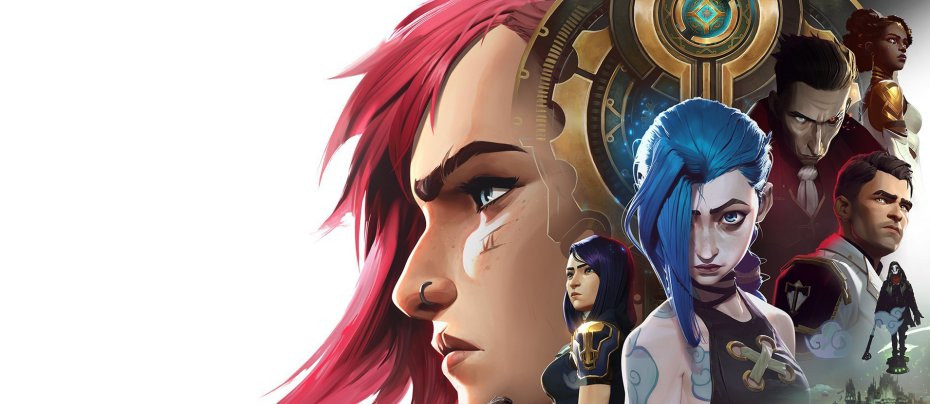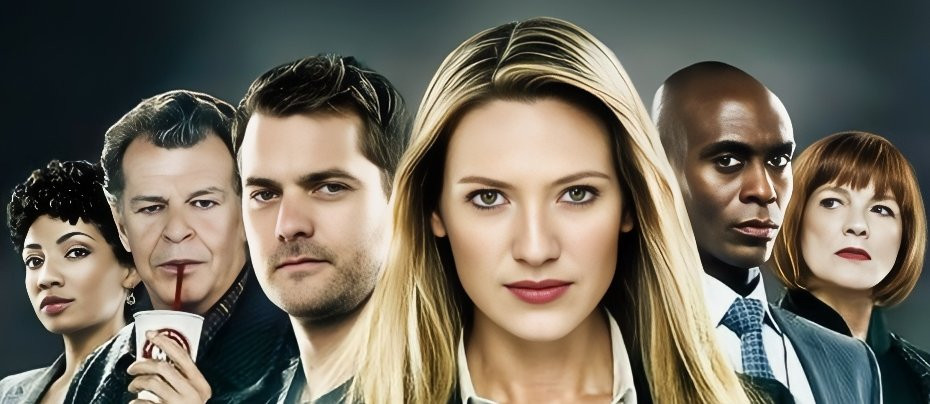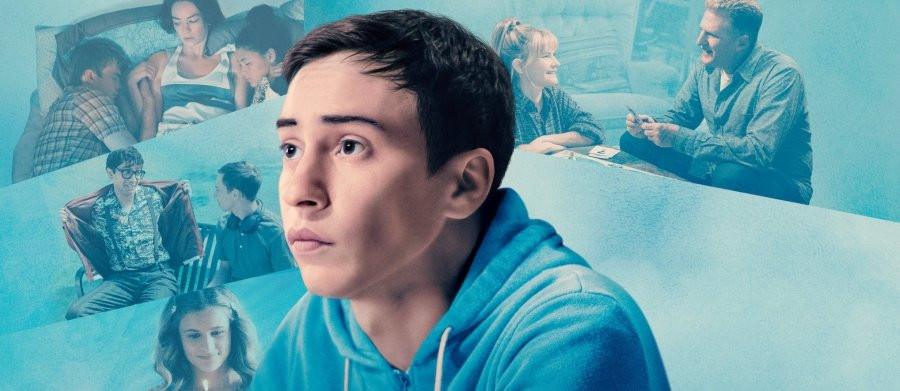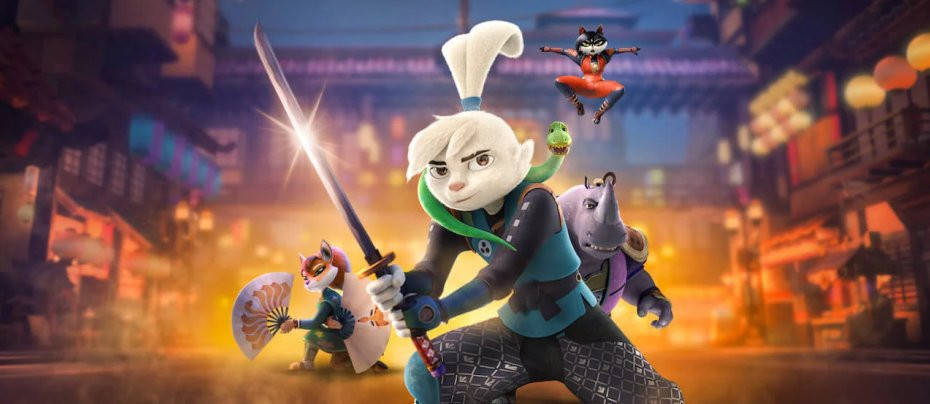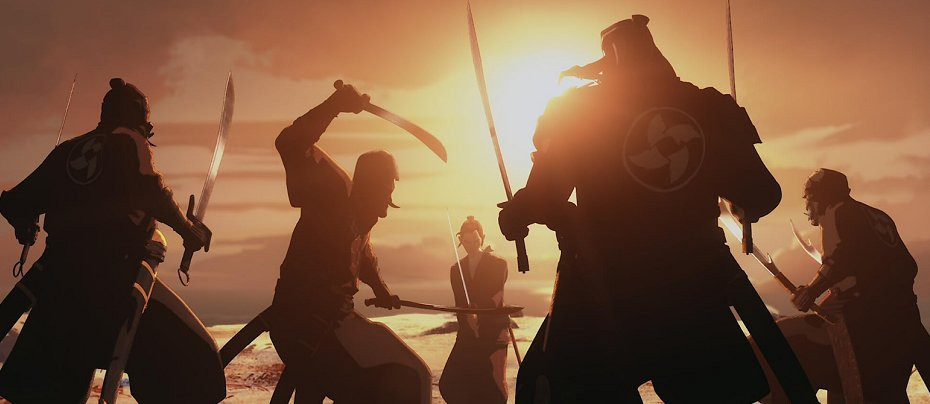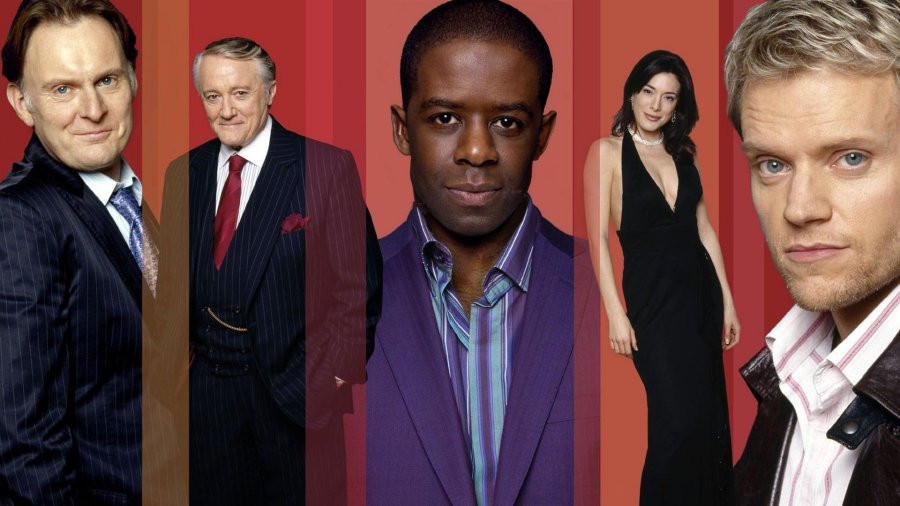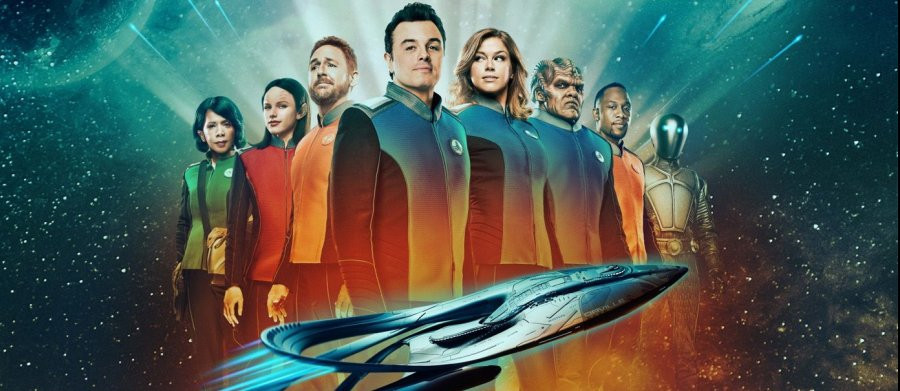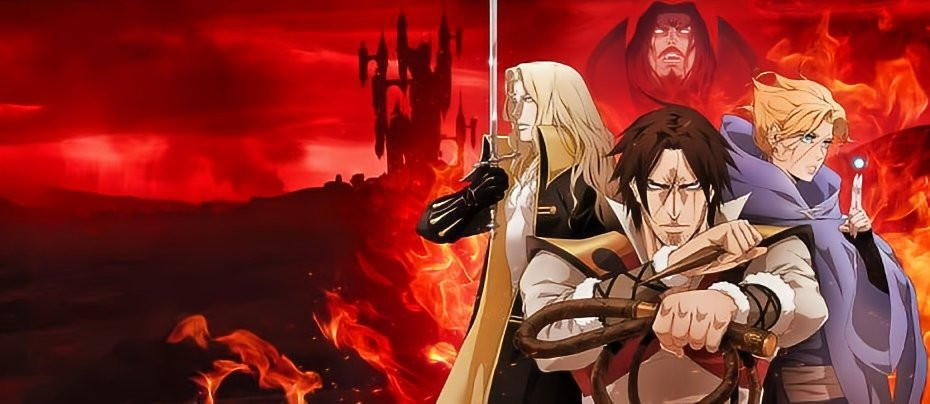
Castlevania
2017 - United StatesCastlevania is reviewed by John Winterson Richards
Scripted entirely by Warren Ellis, a highly controversial but prolific writer in multiple media, Castlevania is a rare early example of an animation adapted fairly successfully from a video game before Arcane made it respectable. It is also a rarity in therefore enjoying the cohesion of a single overarching vision of an individual, a great advantage at a time when most animations feel as if they are written by committee - because in effect they are.
It is set not so much in late 15th Century Eastern Europe as in what appears to be a sort of parallel universe late 15th Century Eastern Europe. Nevertheless it references the established history, literature, and culture of Dracula and Vampirism in ours. Ellis cites Hammer House of Horror as an influence, and it shows.
Like most recent versions of Dracula's story, Castlevania tries to see things, at least in part, from Dracula's point of view. Dracula is portrayed at first as a not really that bad sort of chap apart from his regrettable habit of impaling people. He becomes even more sympathetic when he falls in love with a sparky young woman who seeks him out fearlessly because she wants him to teach her about science: it seems that he has picked up quite a bit of knowledge in the course of his long life. Her influence calms him down a bit, at least for a while.
He becomes considerably less calm when she is burnt as a witch, apparently because she was practising medicine without a licence and interested in science while in possession of a vagina, which is supposed to be a criminal offence in this version of history.

It is at this point that we first encounter the positively vicious anti-Catholicism that permeates the project. The "Black Legend" is said to be the last "acceptable" prejudice and it is on full display here. Later we encounter, among other not very subtle examples of a certain world view, knife wielding thugs apparently dressed as Cardinals and zombies with controlling headbands which appear to be direct visual references to Baroque images of Christ wearing the Crown of Thorns. It could be argued that this crosses the line between being gratuitously offensive about someone else's religion into deliberate blasphemy.
To the disingenuous defence that none of this is meant to be taken seriously because this is not meant to be actual history, only another multiverse thingy, your reviewer, who is not a Roman Catholic, feels obliged to point out that hardly anyone today reads actual history, so too many people get their notions of what really happened from shows like this. Indeed, people producing such shows probably got their notions from other such shows. The French philosopher Baudrillard wrote of a "hyperreality" that is replacing reality in the popular mind, and shows like this are both a cause an effect.
So a few corrective facts are necessary. For a start there is the obvious one that 15th Century Wallachia was overwhelmingly Eastern Orthodox, not Roman Catholic as the visual style of Castlevania implies. Moreover, the Church, whether Eastern Orthodox or Roman Catholic, was the main force for civilisation in wild lands like Wallachia around this time. Far from opposing healthcare, the Church usually provided such as there was, and if the Middle Ages are not generally known as a time of great intellectual progress, there was still quite a lot and it came from Churchmen as often as not. The Church positively encouraged medicine and science. There is no definite case of anyone ever being executed simply for engaging in scientific research. The Church's role in witchcraft trials was generally one of restraint and the most notorious witch hunts usually took place during times of religious conflict when ecclesiastical authority was weak. Castlevania is therefore very misleading.
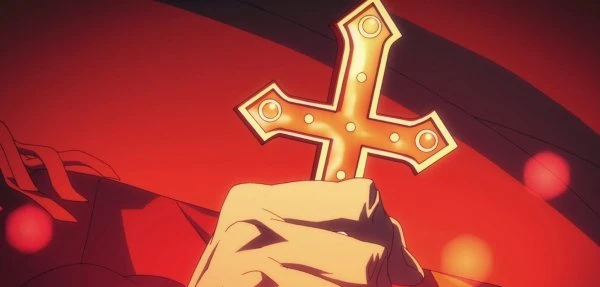
Dracula himself is, of course, wholly ignorant of such niceties and just wants revenge. He settles on genocide but goes about it in a somewhat half hearted manner. His fellow Vampires also have mixed feelings about eliminating their favourite food source. We are therefore offered three main conflicts: between humans and Vampires, within the Vampire community, and in Dracula's tormented soul. This is on top of the usual conflicts among humans, some of whom are so muddle-headed as to collaborate with Vampires for their own reasons.
Humanity in general does not come well out of this, but finds its champions in three bickering outcasts. The last survivor of an excommunicated clan of legendary Vampire hunters is cursed with the regrettable name of Trevor Belmont, someone evidently being unaware that the original Welsh version of the name is spelt Trefor, which would at least be marginally less uncool. Sypha, another sparky young woman - young women all have to be sparky in this sort of thing now - is a magician associated with a heretical sect that seems to be based on the real life Paulicians, who in our universe were active in this part of the world a few centuries before and later influenced the better known Cathars in France. Crossword fans will probably work out the origins of Alucard, the strangely ethereal and slightly androgynous third hero.
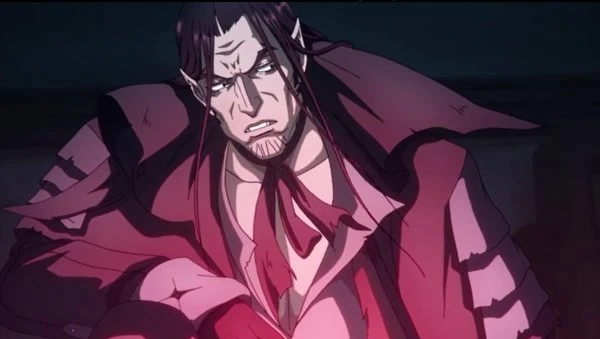
The truncated first season, in which the stage is set and our three heroes are brought together, is fairly undistinguished, both in story and in animation. It is the second season which really serves up the main course as we build to the big fight between the Vampires and the defenders of humanity: the fact that the former are all plotting against each other and the latter are not at ease with each other opens the door to a lot of surprisingly good relationship drama. The interplay between the heroes is particularly good and there is real character development.
That proves hard to follow and the characters separate in the third season, which is set only a few weeks after the second but feels very different. For one thing, there is a diminution of scale, much of the action taking place in a single obscure country town. The fourth season brings a definite return to the epic and reunites the characters, but the story is complicated and not so compelling. Indeed the best parts of the third and fourth seasons are arguably subplots involving side characters that have little impact on the main storyline. One can perhaps see the influence of the show's video game origins in these "side quests."
It is due mainly to the efforts of an outstanding voice cast that we remain engaged with the characters and therefore with the story throughout, even when there are pacing problems. Graham McTavish (Outlander, The Witcher) is a splendidly magisterial Dracula who cannot suppress his own vulnerabilities.
Richard Armitage (Robin Hood, Spooks, and the cinematic The Hobbit trilogy) and James Callis (Battlestar Galactica) are great fun playing Belmont and Alucard like a pair of squabbling siblings. Alejandra Reynoso is a charming Sypha.
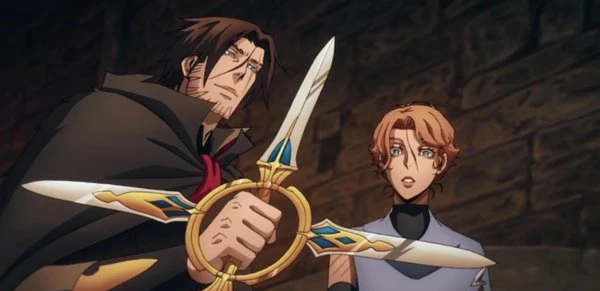
Bill Nighy plays a mysterious Cagliostro type figure who keeps us guessing whether he is a complete charlatan or only a partial charlatan or a man completely out of his depth. Theo James (who also did some excellent voice work is the similarly themed feature length animation The Witcher: Nightmare of the Wolf) and Adetokumboh M'Cormack (Heroes) excel at turning supporting characters into principals with their own story arcs as two human necromancers who choose to serve Dracula with very different motivations. Jaime Murray (Hustle, Dexter, Spartacus, Warehouse 13) and Jessica Brown Findlay (Downton Abbey) are well cast as Vampire politicians while the great Peter Stormare goes completely Peter Stormare as a more traditionalist Vampire. Malcolm McDowell and Titus Welliver (Deadwood, Sons of Anarchy, Bosch) are very different Vampires forming a very uneasy partnership. Jason Isaacs is a small town Judge with secrets who keeps us guessing about his true nature. Matt Frewer goes Full Villain a bad Bishop - there is no other kind in Castlevania. The late Lance Riddick (The Wire, The Legend of Vox Machina) has a brief but typically effective guest role as a ship's master who remains remarkably calm under the circumstances.
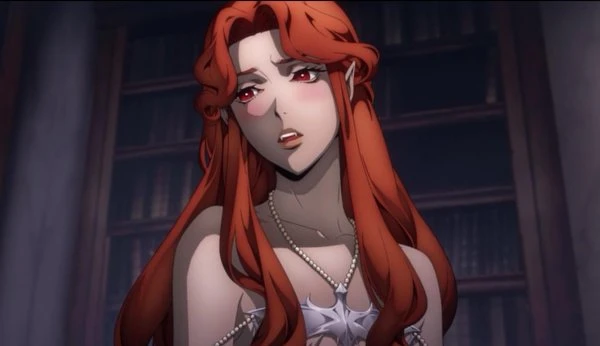
The animation is influenced by the Japanese anime style, in which some of the animators apparently had backgrounds. After an unpromising start, it attains a superior level in the second season. As has been the case with a number of recent animations, especially in the anime style, many of the landscapes and backgrounds, influenced quite obviously by Hayao Miyazaki and Studio Ghibli, are quite beautiful in their own right. The character animation is of more variable quality. The fights, however, are particularly well done. Unlike many productions, Castlevania does not rely too much on fast cutting to give a sense of action and so the viewer retains a fairly good sense of what is going on. This is important because Castlevania tends to save up its action scenes for specific episodes which seem to consist of little else. This might have led to prolonged confusion but they get away with it because it usually remains clear who is doing what to whom and where.
Be warned that this is, like Blue Eye Samurai, very much "adult animation" in the sense of being completely unsuitable for children. Vampire projects are always going to be bloody but the soft core porn in the third season is quite unnecessary.

The theology of this imaginary universe is not clearly drawn and so the dialogue is not as profound as it thinks. The best of it involves the intellectual journey of the necromancer Isaac voiced by M'Cormack, whose Muslim faith is treated with a respect that contrasts glaringly with the crude caricatures of Roman Catholicism.
These caricatures continue in an inferior sequel series Castlevania: Nocturne, which has a great soundtrack and some more lovely animation but lacks the edgy interaction of interesting characters and the strength in depth of the voice cast that lifted the original from the mass of similar projects. To be honest, Castlevania is not one of the best examples of its genre - it is certainly not in the same class as Arcane - but it has useful lessons to teach about how compelling characters can make up for deficiencies in plot, how to do action scenes, and why investing in a strong voice cast is always money well spent.
Seen this show? How do you rate it?
Seen this show? How do you rate it?
Published on February 23rd, 2024. Written by John Winterson Richards for Television Heaven.


